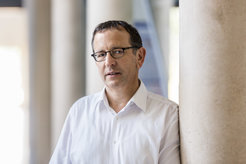Highest European Research Grant Goes To Max Planck Institute Potsdam
Project „Batteries The Future Of Energy Storage“
6.5 million euros from the European Research Council (ERC) go to the team of Professor Markus Antonietti, Director at the Max Planck Institute of Colloids and Interfaces in Potsdam. With this funding, he and his project partner, Professor Patrice Simon from the University of Toulouse, aim to increase the density of energy storage devices such as batteries four to six times. At the same time, the prices for batteries should be reduced to one tenth. "At present, batteries are very expensive and very heavy. We need much cheaper systems to make a sustainable power supply for households and society affordable in the future," says Markus Antonietti.

Electromobility continues to grow. Lithium batteries are used in most electric vehicles for propulsion and must be replaced by alternatives. This is because they are relatively expensive, heavy, environmentally harmful if they are not properly disposed, and the supply of lithium is limited. The former energy production crisis has become an energy storage crisis. "In our research project, we are working on the future of sustainable energy storage by developing fundamental alternatives for storage. To do so, we use novel liquid salts as solvents and novel energy transitions that only exist on the nanoscale and that get more voltage out of each electron," says Antonietti. His colleague Patrice Simon is one of the world's leading electrochemists in the field of supercapacitors, while Antonietti's research group knows how to make small pores in new carbons in which the energy is then stored. "To be precise, the pore is at the center of our work. We are working, so to speak, on the improvement of nothing. Our art is to make more and more of ever smaller nothing. And then new physical rules take place at the border between carbon and nothing", adds Antonietti.
Facts and Figures
In total 440 research teams applied, of which 34 teams from 22 countries received a research award. Germany is involved in 18 research projects and 7 of the 34 Synergy Grants go to Max Planck Institutes of the Max Planck Society.
What Is The European Research Council?
In 2007, the European Research Council (ERC) was founded by the European Union as the first European institution for research funding. Every year, the world's best and most creative researchers of all ages receive funding after intensive applications to carry out their projects in Europe. There are different grants, which differ in amount and duration of funding. Synergy Grants and Advanced Grants are the two highest awards of the ERC. The difference is that Synergy Grants are not awarded to individual researchers, but to research teams consisting of two to four researchers. The aim is to implement ambitious research projects across institute and country boundaries over a period of six years.












